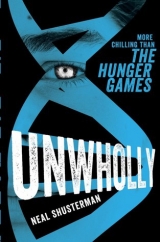
Текст книги "UnWholly"
Автор книги: Neal Shusterman
сообщить о нарушении
Текущая страница: 18 (всего у книги 27 страниц)
42 • Starkey
Jeeves brings Starkey a copy of the list of local unwind orders. There are only three kids on this list deemed savable, and none of them are storks. But today is the day that things change. There is a storked kid on the list, ignored and forgotten.
Jesus LaVega
287 North Brighton Lane
Well, Connor doesn’t have a monopoly on rescuing Unwinds. It’s high time Starkey took things into his own hands.
“Hey, we’re saving Jesus, instead of him saving us,” someone says when Starkey tells the Stork Club his plan. Another kid raps him on the head. “It’s pronounced Haysoos, moron.”
But regardless of how he pronounces his name, Jesus is about to get a wholly visitation.
• • •
At eleven o’clock p.m., one day before the Juvies are due to come for Jesus, Starkey and nine Stork Clubbers storm the house at 287 North Brighton Lane. They have weapons, because Starkey picked the arsenal lock. They have cars, because the kid in charge of vehicle maintenance is a loyal member of the Stork Club.
They don’t knock, they don’t ring. They break down the doors, front and back, crashing the place like a SWAT team taking down a crack house.
A woman screams and herds two younger kids to a back room. Starkey doesn’t see anyone the right age to be the target of their rescue. He goes into the living room in time to see a man pull down a curtain rod and turn to him—it’s the closest thing to a weapon the man can find on such short notice. Starkey easily disarms him and pushes him up against the wall with the muzzle of a submachine gun to his chest. “Jesus LaVega. Tell me where he is. Now!”
The father’s eyes dart back and forth in panic, then fix on something behind Starkey. Starkey turns in time to see a baseball bat swinging at him. He ducks, and the bat breezes past an inch from his head. The kid holding the bat is the size of a linebacker.
“No! Stop! You’re Jesus LaVega, right? We’re here to save you!”
But that doesn’t stop him from swinging the bat again. It connects with Starkey’s side. An explosion of pain. Starkey goes down, his weapon flies behind a sofa, and now the kid is over him, hefting the bat once more. Starkey can’t catch his breath. His side hurts so much he can only breathe shallow gulps of air.
“Juvies! Here! Tomorrow!” Starkey gasps. “Your parents! Unwinding you!”
“Nice try!” he says, and pulls back the bat, ready to swing again. “Run, Dad! Get out!” The man tries to scramble away but is cornered by other storks. Doesn’t this kid get it? Doesn’t he realize they already signed the order to have him unwound? Jesus LaVega tenses his muscles to swing just as one of Starkey’s storks comes up behind him with a large football trophy and swings the marble base at his head. The heavy stone connects with the back of Jesus’s head, and he crumples to the ground instantly. The trophy falls to the floor, broken.
“What did you do?” screams Starkey.
“He was gonna kill you!” screams the stork.
Starkey kneels down beside Jesus. Blood pours out of his head, soaking the carpet. His eyes are half-open. Starkey feels for a pulse but can’t find one, and when he turns the kid’s head, he can see how badly his skull was crushed by the heavy trophy base. One thing is certain: Jesus LaVega is not going to be unwound. Because he’s dead.
Starkey looks to the kid who did it, who panics under Starkey’s gaze. “I didn’t mean it, Starkey! Honest! I swear! He was gonna kill you!”
“It’s not your fault,” Starkey tells him, then turns to the kid’s father, who’s cornered like a spider.
“You did this!” Starkey screams. “You kept him here all his life just so you could unwind him. Do you even care that he’s dead?”
The man is horrified by the news. “D-dead? No!”
“Don’t pretend you care!” Starkey can’t hold it in anymore. He can’t hold back. This man—this monster who would unwind his stork-brought son—has to pay for what he’s done!
Ignoring the pain in his side, Starkey swings his foot, connecting with the man’s torso. He should feel this pain, not me. He should feel all of it! Starkey kicks again and again. The man screams, the man moans, but Starkey keeps swinging his foot, unable to stop—it’s as if he’s channeling the fury of every doorstep baby, every unwanted child, all kids everywhere who were treated like something less than human just because they were born to mothers who didn’t want them.
Finally one of the other storks grabs Starkey, pulling him away.
“That’s enough, man,” he says. “He gets the idea.”
The man, bloody and beaten, still has enough strength to crawl out the door. The rest of his family has escaped too, running to neighbors. They’ve probably called the police, and Starkey realizes that he can’t stop now, he’s gone too far—he has to take this all the way. This isn’t what he wanted, but somehow he can use it. Yes, the kid they came to rescue is dead, but this night can’t end with that. It has to stand for something. It has to be worth something. Not just for Starkey, but for all storks.
“Let this be a warning,” he yells out the front door as the man stumbles away. He spots neighbors on their porches. Strangers are there to hear his words. Good! It’s time for people to listen. “Let this be a warning,” he says again, “to anyone who would unwind a stork! You will all get what’s coming to you!” Then, in a flash of inspiration, he runs through the house and into the garage.
“Starkey!” one of the others yells after him. “What the hell are you doing?”
“You’ll see.”
In the garage he finds a gas can. It’s only half-full, but half is enough. He runs through the house pouring gasoline everywhere, and on the mantel above the fireplace he finds a book of matches.
Moments later he’s racing across the lawn away from the house, toward his friends in the waiting Jeeps, while an ominous glow rises within the house behind him. By the time he climbs into a Jeep, flames are rising in the windows, and the moment the Jeeps screech away into the night, those windows begin to explode, and smoke pours forth from the rising inferno. The entire house has become a blazing beacon to let the world know that Mason Starkey was here, and people are going to pay.
43 • Avalanche
This document I sign of my own free will.
That was the last line of the consent form that Risa Ward signed, just as Roberta had predicted she would. Signing that form has given her a new spine and the use of her legs, but that’s not all it did. It set into motion a cascading series of events that Risa could not have predicted, and yet was expertly orchestrated by Roberta, her associates, and their money.
. . . I sign of my own free will.
Risa has never gone skiing—such frivolous activities were not offered to state wards—yet lately she’s been dreaming that she’s skiing down a triple black diamond slope, chased by the leading edge of an avalanche. There’s no stopping until she either reaches the bottom, or sails off a cliff to her doom.
. . . my own free will.
Before the news interviews, before the public service announcements, before she knows any of what she’ll be asked to do, Risa’s damaged spine is replaced, and she awakes from a five-day medically induced coma into her brave new life.
44 • Risa
“Tell me if you can feel this,” a nurse says, scraping Risa’s toe with a strip of plastic. Risa gasps in spite of herself. Yes, she feels it—and it’s not just a phantom sensation. She can feel the sheets brushing against her legs. She can feel her toes again. She tries to move them, but just moving her toes makes every part of her body ache.
“Don’t try to move, dear,” the nurse tells her. “Let the healing agents do their job. We’re using second-generation healing agents. You’ll be up and walking in two weeks.”
It speeds her heart to hear those words. She wishes the connection between her heart and her mind could be more direct—that the part of her that wants this could be firmly ruled by the part of her that doesn’t—because although her mind wants to despise what they’ve done for her, the part of her that knows no reason is filled with joy at the prospect of holding her own balance and moving under the power of her own legs.
“You’ll require a lot of physical therapy, of course. Not as much as you might think, though.” The nurse checks the devices that are attached to her legs. They are electrical stimulators, which cause her muscles to contract, awakening them from their atrophied state, building them back to prime body tone. Each day she feels like she’s run miles, although she hasn’t left the bed.
She’s no longer in a cell. It’s not really a hospital, either. She can tell it’s some sort of private home. She can hear the roar of ocean surf outside her window.
She wonders if the staff knows who she is and what happened to her. She chooses not to bring it up, because it’s too painful. Better just to take it day by day and wait until Roberta comes for her again, to tell her what more she has to do to fulfill the terms of her so-called contract.
It’s not Roberta who visits her, though, it’s Cam. He’s the last person she wants to see, if she indeed can call him a person. His hair has filled in a bit since the time she first saw him, and the scars on his face from the various grafts are slimmer. You can barely see the seam where the different skin tones touch.
“I wanted to see how you were feeling,” he says.
“Sick to my stomach,” she tells him, “but that only started when you walked in.”
He goes to the window and opens the blinds a bit more, letting in bars of afternoon light. A particularly loud wave crashes on the shore outside the window. “ ‘The ocean is a mighty harmonist,’ ” he says, quoting someone she’s probably never even heard of. “When you can walk,” Cam tells her, “you should look at your view. It sure is pretty this time of day.”
She doesn’t answer him. She just waits for him to leave, but he doesn’t.
“I need to know why you hate me,” he asks. “I’ve done nothing to you. You don’t even know me, but you hate me. Why?”
“I don’t hate you,” Risa admits. “There’s no ‘you’ to hate.”
He comes up beside her bed. “I’m here, aren’t I?” He puts his hand on hers, and she pulls away.
“I don’t care who or what you are, nobody touches me.”
He thinks for a moment, then says, in all seriousness, “Would you like to touch me then? You can feel all the seams. You can see what makes me me.”
She doesn’t even dignify that with a response. “Do you think the kids who were unwound to be a part of you wanted it?”
“If they were tithes, they did,” Cam says, “and some of them were. As for the other ones, they had no choice . . . any more than I had a choice in being made.”
And for a moment, within the fury she feels toward the people who created him, Risa realizes that Cam, as much as all the kids who were unwound to make him, is a victim too.
“Why are you here?” she asks him.
“I have lots of answers to that one,” Cam says proudly. “ ‘The sole purpose of human existence is to kindle a light in the darkness of mere being.’ Carl Jung.”
Risa sighs, exasperated. “No—why are you here, in this place, talking to me? I’m sure Proactive Citizenry has more important things for their beta test to do than talk to me.”
“Where the heart is,” he says. “Uh—I mean—I’m here because this is my home. But I’m also here because I want to be.”
He smiles at her, and she hates the fact that his smile is sincere. She has to keep reminding herself that it’s not his smile at all. He’s just wearing the flesh of others, and if it was all peeled away, there’d be nothing in the center. He is little more than a cruel trick.
“So did your brain cells come preprogrammed? A head full of ganglia implants from the best and the brightest?”
“Not all of them,” Cam says quietly. “Why do you keep holding me responsible for the things I had no control over? I am what I am.”
“Spoken like a true god.”
“Actually,” he says, returning a little bit of her attitude, “God said, ‘I am that I am,’ if you’re going by the King James version.”
“Don’t tell me—you came programmed with the entire Bible.”
“In three languages,” Cam says. “Again, not my fault, it’s just there.”
Risa has to laugh at the audacity of his creators—did it occur to them that filling him with biblical knowledge while playing God was the ultimate hubris?
“And anyway, it ain’t like I can regurgitate it verbatim, I just got a workin’ knowledge of a whole lotta stuff.”
She looks at him, wondering whether the sudden change in speech pattern from advanced-placement to country-casual is a joke, but she can tell it’s not. She supposes as connections spark through the various and sundry bits of his brain, he kicks out all kinds of talk.
“May I ask you what made you change your mind?” he asks. “Why did you agree to the operation?”
Risa looks away. “I’m tired,” she tells him, even though she’s not, and shifts to face away from him. Even this action of rolling sideways in her bed was something she could not easily accomplish before the operation.
When it becomes clear that she’s not going to answer him, he asks, “May I come see you again?”
She keeps her back to him. “No matter what I say, you’ll come anyway, so why bother asking?”
“Well,” he says as he leaves, “it would be nice to have permission.”
She lies there in that position for a long time, trying not to give a foothold to any of the thoughts swimming through her mind. Finally she dozes off. This is the first night she dreams of the avalanche.
• • •
Roberta is off somewhere taking care of business on the day Risa first walks—and only a week after waking up, instead of two. It’s a day that brings to a head all her conflicted emotions. She wants this to be a personal moment, not something shared, but as usual, Cam comes uninvited.
“Milestone! This is a momentous occasion,” he tells her cheerily. “It should be witnessed by a friend.”
She throws him an icy gaze, and he does a verbal backpedal.
“Aaaand since no friends are present, I’ll have to do.”
A male nurse who looks more like a steroid-pumped boeuf grabs Risa’s upper arm and helps her swing her legs off the bed. It’s an unearthly sensation to actually feel them cantilevered out over the floor. She bends her knees shakily until she feels the tips of her toes touch the wooden floor.
“They should have a rug on the floor,” Cam tells Nurse Beefcake. “To make it softer for her.”
“Rugs slip,” Nurse Beefcake replies.
With the nurse holding her on one side, and Cam on the other, she rises to her feet. The first step is the hardest. It’s like dragging her foot through mud, but the second step comes with remarkable ease.
“Atta girl!” says the nurse, like he’s talking to a baby taking her first step—and in a sense she is. She has no balance whatsoever, and her knees feel like they’ll give out at any moment, but they don’t.
“Keep going,” Cam says. “You’re doing great!” By the fifth step, she can’t hold back the visceral joy she’s been suppressing. A smile fills her face. She becomes short of breath and giggles giddily at the simple joy of walking.
“That’s it,” says Cam. “You’re doing it! You’re whole again, Risa! You have a right to enjoy it!”
And although she doesn’t believe that’s true, she can’t fight the moment. “The window!” she says. “I want to look out the window.”
As they turn slightly to angle toward the window, Nurse Beefcake tentatively lets go, and now it’s just Risa with her arm around Cam’s shoulder and his arm around her waist—and she wants to be furious that she wound up stuck in this position with him, but that feeling is overridden by giddy sensory overload from her feet, her ankles, her shins, her thighs; parts of her body that just a few short days ago felt nothing at all.
45 • Cam
For Cam this is nothing short of heaven. She’s holding him. Relying on him. He convinces himself that this is the moment that all the barriers will fall. He’s convinced she will turn to him and kiss him even before they reach the window.
She grips his neck tightly for support. Her hold on him pinches the seam there, but it’s a good feeling. He imagines her putting pressure on all his seams, making them ache. No pain could ever feel so good.
They reach the window. No kiss, but she hasn’t let go of him either. She can’t or she’ll fall, but Cam wants to believe she’d hold him anyway.
The sea is rough this morning. Spray launches high into the air with the pounding of eight-foot rollers. An island can be seen in the distance.
“No one ever told me where we are.”
“Molokai,” Cam tells her. “In Hawaii. The island used to be a leper colony.”
“And Roberta owns this place?”
Cam detects unveiled bitterness in the way Risa says her name. “It’s owned by Proactive Citizenry. Actually, I think about half the island is. This place was some rich guy’s summer home once, but now it’s their medical research center—and Roberta is the head of medical research.”
“Are you her only project?”
It’s a question Cam has never even considered before. As far as he knows, he is the center of Roberta’s universe. “You don’t like her, do you?”
“Who, me? No, I love her dearly. Evil scheming bitches are my favorite kind of people.”
Cam feels a sudden protectiveness and an unexpected spike of anger. “Red light!” he blurts. “She’s the closest thing I have to a mother.”
“You’d be better off storked.”
“Easy for you to say. A ward like you doesn’t even know what a mother is.”
Risa gasps, then brings her hand back and slaps him hard across the face. The momentum of the slap pushes her off balance, and she falls backward—but the nurse is there to catch her. He gives Cam an accusing glance, then returns his attention to Risa. “Enough for now,” the way-too-muscular male nurse says. “Back into bed.”
He helps Risa back to bed while Cam stands impotently at the window, not sure who to be mad at—himself, her, or the nurse for taking her away from him.
“Did the slap sting evenly, Cam,” she asks with a nasty bite in her voice, “or do the kids in your face all feel it differently?”
“Teflon!” he says, refusing to let her comment stick.
“Muzzle!” He cannot let himself lash out again. He cannot! He takes a deep breath, picturing the tumultuous sea calming to a glassy lake.
“I know I invited that slap,” he tells her calmly, “but watch what you say about Roberta. I do not speak unkindly of the people you love—have the same courtesy for me.”
• • •
Cam gives Risa some space. He knows this change in her life must be as traumatic as it is wonderful for her. He still doesn’t quite understand what made Risa change her mind about allowing the operation, but he knows Roberta can be persuasive. He likes to pretend that some of it had to do with him—that deep down, beneath her initial repulsion, was a curiosity, perhaps even an admiration for the mosaic that had been created from all his disparate parts. Not the one they put together for him, but how he took what he was given and made it all work.
They eat one meal a day together. “It is imperative,” Roberta tells him, “if the two of you are ever going to bond, that you dine together. Meals are when the psyche is most vulnerable to attachment.”
He wishes Roberta didn’t make it all sound so clinical. Growing accustomed to each other’s company shouldn’t be about Risa’s “vulnerability to attachment.”
Risa does not yet know that she is here to be his companion.
“Do not rush this,” Roberta has told Cam. “She must be groomed for the role, and we have other things planned for her first. We’re turning her folk-legend status to our advantage, creating a powerful media presence before we link the two of you together publicly. That will take time. In the meantime, be your wonderful, charming self. She is yours to win.”
“And if I don’t?”
“I have every confidence in you, Cam.”
Risa is in his thoughts through each activity of the day. She becomes a thread weaving through all the seams of his mind, binding them together more tightly. And she’s thinking of him, too. He knows because of the way she watches him secretly. He plays basketball one afternoon with an off-duty guard. He has his shirt off, revealing not only his seams, but his musculature, in tip-top shape. A boxer’s six-pack abs, a swimmer’s powerful pecs—flawless muscle groups reined in by a finely tuned motor cortex to produce the perfect layup. Risa watches him play from a window in the main living room. He knows, but he doesn’t let on—he just delivers spectacular game, allowing his body to speak for itself. Only when he’s done playing does he glance up at her, to let her know that her stolen glimpses of him aren’t stolen at all—they’re given freely. She backs away from the window into shadows, but they both know she was watching. Not because she had to but because she wanted to, and Cam knows that makes all the difference in the world.








